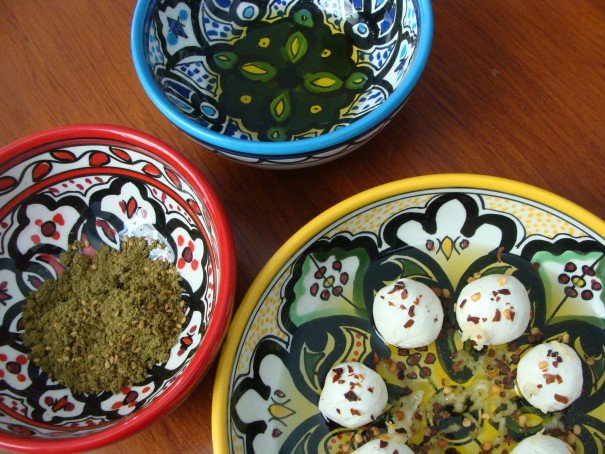
Eat the Breakfast of a King and the Dinner of a Pauper

Eat the Breakfast of a King and the Dinner of a Pauper
Labneh in the West Bank
One can learn much about labneh—that is, the version of the breakfast food that appears in Palestinian homes—through the word itself.
Both the name and the substance labneh are derived from laben, yogurt. But it also shares a root with “block,” as in the substance used to build. And the thick, strained yogurt—sometimes dried and rolled into balls—is indeed a cornerstone of the Palestinian diet.
In Arabic, they say “Eat the breakfast of a king, the lunch of a prince, and the dinner of a pauper.” This doesn’t mean that labneh should be decked out. No, it’s humble; it dresses accordingly in a thin coat of olive oil and is eaten with pita.
My husband, who is from the West Bank, explains that labneh has already been perfected; there’s no need to improve on it. When we’re feeling festive, however, we sprinkle labneh balls with crushed garlic and dried chili. This isn’t uncommon in Palestinian homes. And whether one chooses the thick labneh spread or the condensed balls, which are preserved in oil, is as much of a matter of taste as whether one prefers labneh made from sheep, cow, or goat milk.
The spread is creamy, with a slightly tart finish. To make labneh balls, one dries yogurt out; the loss of liquid means a concentrated flavor. Although the balls are delicate, crumbling when pushed upon with pita, their flavor is strong, running the gamut from tangy to sour, depending on the milk from which it is made.
In recent years, it’s begun to pop up on menus in Tel Aviv’s trendiest restaurants, not as a simple breakfast food but, rather, as an ingredient that’s been interpreted, played with, and incorporated into larger dishes. At Mizlala, owned by celebrity chef and restauranteur Meir Adoni, labneh makes a cameo in the “Asian sashimi” as part of a glaze that also consists of soy and silan (date syrup). At Shaffa—a tapas bar located in Jaffa’s gentrified shuk hapishpishim (flea market)—labneh comes adorned with a glistening crown of crushed tomatoes.
But the labneh spreads I find in Tel Aviv and Jaffa’s restaurants don’t cut it. I’m used to the balls and I’m used to the ones that are made in the West Bank; these products are banned in Israel. With things as they are right now, however, I spend most of my time inside the Green Line, haunting the grocery stores, looking for the “right” labneh, dismayed to find only bland, mass-produced spreads that lack the punch of their Palestinian counterparts.
And then a stroke of luck: at shuk hacarmel (Carmel market) in central Tel Aviv one Friday, I spy the familiar balls, packed in oil. The vendor tells me they come from the Galilee, an Arab area of the country. I pay the steep 20 shekel ($5 USD); I pay the same price again when I find another jar of labneh balls in Jaffa at an Arab bakery. “These are from Nablus,” a city in the West Bank, the worker tells me, proudly. Maybe he doesn’t know about the ban.
I wrap my precious finds in plastic bag after plastic bag so when the oil leaks out—as it invariably does—it won’t soak my clothes. I pack them in my suitcase and bring them back to Florida so my husband and I can eat them at home, for breakfast, as we ought to.